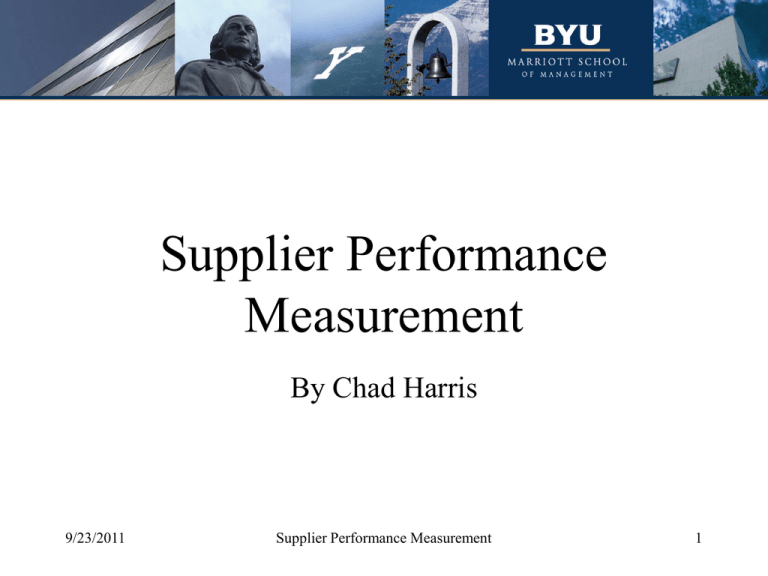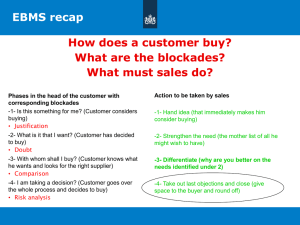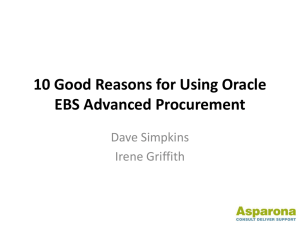
Supplier Performance
Measurement
By Chad Harris
9/23/2011
Supplier Performance Measurement
1
What Will Be Covered
• Supplier Performance Measurement Defined
• Brainstorming Activity: Supplier Performance
Measurement In Your Company
• Principles For Implementing Supplier Performance
Measurement System
• Some Areas That Can Be Measured
• Real World Example
• Practice Exercise
9/23/2011
Supplier Performance Measurement
2
What is Supplier Performance
Measurement?
The methods and systems used to collect and provide
information needed to measure and rate suppliers on
a continuous basis. It allows a firm to:
• Evaluate the contributions of suppliers to the
firm’s overall business objectives
• Improve co-ordination and quality of
collaboration between the firm and its suppliers
9/23/2011
Supplier Performance Measurement
3
Brainstorming Exercise
• Why should a company be active in
measuring the performance of its suppliers?
• How can measuring supplier performance
improve a supply chain?
• How can supplier performance
measurement benefit the end consumer?
9/23/2011
Supplier Performance Measurement
4
Jonathan Hughes’ Seven
Principles of Supplier Metrics
•
•
•
•
Measure…
Develop and Utilize...
Be Comfortable…
Situate Metrics…
9/23/2011
• Define Jointly…
• Share data…
• Meaningful metrics…
Supplier Performance Measurement
5
Principle 1:
Measure What Is Important
A firm should measure the meaningful aspects
of performance, not just those that are easiest
to identify and measure. Meaningful
measures will:
• Provide a unified focus on objectives
• Improve coordination with suppliers
• Deliver greater value to the consumer
9/23/2011
Supplier Performance Measurement
6
Principle 2:
Develop Predictive Metrics
A firm should focus on developing predictive
metrics and measures of outcomes. Predictive
metrics can:
• Help identify problems early on
• Allow a firm to predict outcomes more
accurately
9/23/2011
Supplier Performance Measurement
7
Principle 3:
Be Comfortable with Subjectivity
Many critical measures and metrics are
subjective by nature, and therefore are subject
to individual interpretation and human
judgment.
9/23/2011
Supplier Performance Measurement
8
Principle 4:
Situate Metrics to Facilitate Dialogue
Metrics should facilitate open dialogue within
the firm as well as with suppliers. This will
help the firm and its suppliers to:
• Interpret the metrics
• Improve overall performance
• Improve the quality of the relationship
9/23/2011
Supplier Performance Measurement
9
Principle 5:
Define Metrics Jointly
The firm should work with suppliers to define
the metrics. These metrics can then be used
jointly by the firm and its suppliers to:
• Diagnose existing problems
• Define potential solutions
9/23/2011
Supplier Performance Measurement
10
Principle 6:
Share Data
The information collected should be shared
with suppliers. This will allow the suppliers
to :
• Trace their performance in key areas
• Compare their performance with the
performance of key competitors
9/23/2011
Supplier Performance Measurement
11
Principle 7:
Define Metrics to Assess Value
Metrics should allow a firm and its suppliers
to analyze the value each party receives from
the relationship.
• Is the supplier helping the firm
• Is the firm helping the supplier
9/23/2011
Supplier Performance Measurement
12
Examples of Potential
Performance Measures
• Quality
• Delivery
• Cost
9/23/2011
• Communication
• Innovation
• Customer Satisfaction
Supplier Performance Measurement
13
Real World Example:
Walmart
Some of the key elements of Walmart’s
supplier performance measurement system:
• Supplier recognition programs
• “Retail Link” allows suppliers to
benchmark with competing suppliers
• Training to help suppliers improve
9/23/2011
Supplier Performance Measurement
14
Practical Exercise
ABC Company would like to see how several of its
key suppliers are performing in the areas of quality,
delivery, communication, and customer satisfaction.
• Instructions:
– Examine the scores that have been given to the suppliers in these key areas.
– Determine the weighted score by multiplying the assigned score by the weight.
– Add the four weighted scores up to determine the suppliers overall weighted score
• Category Weights:
–
–
–
–
9/23/2011
Quality – 40%
Delivery – 30%
Communication – 15%,
Customer Satisfaction – 15%
Supplier Performance Measurement
15
ABC’s Suppliers
• Company X
–
–
–
–
• Company Y
Quality: 5 pts.
Cost: 4 pts.
Communication: 3 pts.
Customer Satisfaction: 5 pts.
–
–
–
–
Quality: 5 pts.
Cost: 5 pts.
Communication: 3 pts.
Customer Satisfaction: 4 pts.
**Each category is out of 5 possible points
9/23/2011
Supplier Performance Measurement
16
ABC’s Suppliers (cont.)
• Company Z
–
–
–
–
• Company AB
Quality: 4 pts.
Cost: 4 pts.
Communication: 5 pts.
Customer Satisfaction: 5 pts.
–
–
–
–
Quality: 4 pts.
Cost: 5 pts.
Communication: 5 pts.
Customer Satisfaction: 5 pts.
**Each category is out of 5 possible points
9/23/2011
Supplier Performance Measurement
17
Discussion Questions
1. Which supplier is performing the best in
terms of the weighted score?
2. Which company has the lowest score?
3. What actions could ABC Company take
after reviewing these scores?
9/23/2011
Supplier Performance Measurement
18
Summary
A consistent and thorough process for
measuring supplier performance can help a
firm:
• Improve Quality of Products
• Increase Efficiency of Supply Chain
• Deliver Greater Value to the Consumer
9/23/2011
Supplier Performance Measurement
19
Reading List
•
Supplier Metrics That Matter, by Jonathan Hughes, CPO Agenda, Autumn
2005
•
Supply Chain Management: From Vision to Implementation, by Stanley
E. Fawcett, Lisa M. Ellram, and Jeffrey A. Ogden, Pearson Prentice Hall, 2007
•
How Many ‘C’s in Partner?, by Neil Fuller, Supply Management, September
2005.
•
Creating the Ideal Supplier Scorecard, by Dr. Robert J. Trent, Supply Chain
Management Review, March 2010
9/23/2011
Supplier Performance Measurement
20








